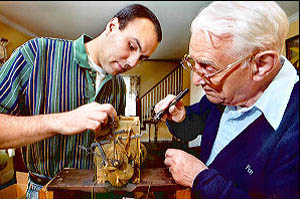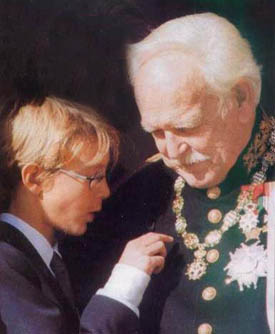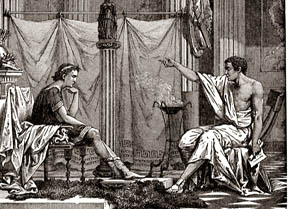 |
Formation of Children
Part II
A Youth's Relations with His Superiors
Marian T. Horvat, Ph.D.
The first part of the chapter on authority speaks of how a young man should treat the teacher, the priest, and the civil leaders. Here the chapter continues with the special respect and esteem owed by youth to the elderly.
The expression of such respect and esteem lies in small acts of kindness: standing aside to let an elderly man pass first, helping a lady down the steps or into the car, a friendly greeting accompanied by a few words. Youth should develop the good custom of visiting elderly family members and friends, not just when they are sick or in the hospital, but on a regular basis. Bringing them small gifts of fruit, flowers or freshly baked food is a thoughtful gesture.
Need it be said that when parents or grandparents can no longer care for themselves, the Catholic child has the obligation to maintain them physically, morally and psychologically, as well as to surround them with the proportionate degree of respect and affection they deserve. Doing this, the child is just returning the favors he received when he was an infant.
The elderly
The elderly also deserve special treatment. Today we have the bad tendency to look down on the elderly and despise the things of the past. Our modern education overvalues the importance of youth and has an exaggerated idea of the need to be up-to-date. This adoration of youth and the latest fashion has reached such a point that the elderly see themselves set aside and even excluded from public deliberations, counsels and meetings, where they are viewed as out-of-date.

A youth learns the family watchmaking tradition
from his grandfather |
Linked to this adoration of youth is a culture that teaches that the most important thing in life is to seek pleasure and have fun. This attitude breeds a habit of egoism. Instead of admiring the wisdom of the elderly, the fruit of discernment, long experience and valorous self-sacrifice, nowadays the elderly are disdained.
Every sensible person with a medium level of civility recognizes the superficiality of a young man who brags incessantly of his own talents, who flaunts progress and ridicules the past as behind the times, and who scorns the advice and the stability of judgment of those with greater experience. Shallow youth like this avoid the company of the elderly, imagining that old people are fools, always repeating the same things, opposed to modern ideas and the joys and pleasures of youth.
Nevertheless, it will always be the sign of the well bred man to show the elderly all respect and the most delicate attentions. He should show such esteem not only moved by charity for infirmities that often accompany aging, but out of respect for their wisdom and merit.
Let us respect them because of their suffering, their knowledge and their labors to make a better life for their children and for those who would come after them, that is, us.

A boy admires the military decoration of his grandfather, Prince Rainier of Monaco |
Let us honor the elderly also because they are for us – with all their aches and pains and failing health – a visible reminder of the fleeting nature of this earthly life. Their situation is a visible invitation for us to imitate them when they are good. And, if they are bad, it reminds us to practice virtue and live a more Catholic life so that we will be better prepared to appear before the Judgment of God.
Let us compensate the coldness that isolation, infirmities and long life produces by a redoubling of our courtesy, finesse and tenderness. The fulfillment of this duty brings an immediate recompense. Not only are the hearts of the elderly warmed by contact with youth, but also the youth may draw from the lips of the elderly the history of the past and lessons of a profound wisdom based on experience.
Youth has difficulty to believe in death because they do not realize how rapidly time goes by. But they can and should know that principles and good sentiments have no age, and that the elderly person conserves sound principles and a sensitive and responsive heart under his white hair.
“Do unto others what you would have them do unto you,” says the Gospel. Yes, treat the elderly with deference, sympathy and veneration, so that after they have struggled and suffered, when they are in the somber, austere winter of life, they might have the consolation of enjoying contact with the younger generations.
Examples of respect for superiors
1. Young Samuel, a future judge of Israel, was resting one night before the tabernacle. Suddenly he heard a voice that called him, “Samuel! Samuel!” Thinking that it was the voice of the High Priest, he replied, “Here I am, master, for you have called me!” But it was not the High Priest, it was the voice of God. This scene was repeated a second, and then third time, until Samuel realized that the call was from God and he responded, “Speak, Lord, for thy servant is listening!” It is a beautiful example of the respect and obedience owed to masters.

Alexander listening respectfully to his master Aristotle |
2. For eight years Alexander the Great received lessons from Aristotle, the greatest philosopher of Antiquity. This worthy master made a great effort to develop qualities and virtue in his student. Grateful for these wise teachings, the valiant conqueror of Asia was accustomed to say, “I owe more to Aristotle, my master, than to Philip, my father. For while the latter gave me life, the former gave me the good life [of contemplation].”
3. Theodosius the Great, one of the most famous Roman Emperors, confided the education of this two children Arcadius and Honorius to a preceptor of great capacity and virtue named Arsenius. One day, during the lesson, the Emperor entered the classroom. The master Arsenius was standing and the princes were seated. Theodosius did not approve of the lack of respect his sons were showing for their master. He reproved them vigorously and demanded that the two boys stand while Arsenius, seated, gave the lesson.
“My sons,” said Theodosius, “to your father you owe the life of your body and the hope of a crown. But to Arsenius, you are indebted for an even more precious good: a good education that will make you virtuous and worthy of the throne.
As punishment for the lack of respect on this occasion, the Emperor ordered his sons to pass eight days in court without wearing the insignias of their dignity.

Posted December 10, 2007


Related Topics of Interest
 Chapter 11: Discretion in Words and Actions Chapter 11: Discretion in Words and Actions
 Chapter 12: Good and Bad Curiosity Chapter 12: Good and Bad Curiosity
 Chapter 13: Loyalty Chapter 13: Loyalty
 Chapter 14: Punctuality Chapter 14: Punctuality
 Chapter 15: Amiability Chapter 15: Amiability
 Chapter 16: The Braggart Chapter 16: The Braggart
 Chapter 17: The Value of Distinction Chapter 17: The Value of Distinction
 Chapter 18: Let's Not Forget the Greeting Chapter 18: Let's Not Forget the Greeting
 Chapter 19: The Blessing Chapter 19: The Blessing
 Chapter 20: The Family Milieu Chapter 20: The Family Milieu

Related Works of Interest
|
|
Formation | Cultural | Home | Books | CDs | Search | Contact Us | Donate

© 2002- Tradition in Action, Inc. All Rights Reserved
|
 |
|